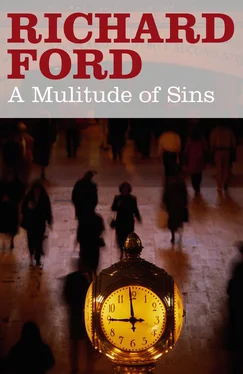Richard Ford - A Multitude of Sins
Здесь есть возможность читать онлайн «Richard Ford - A Multitude of Sins» весь текст электронной книги совершенно бесплатно (целиком полную версию без сокращений). В некоторых случаях можно слушать аудио, скачать через торрент в формате fb2 и присутствует краткое содержание. Год выпуска: 2001, Издательство: Bloomsbury Publishing, Жанр: Современная проза, на английском языке. Описание произведения, (предисловие) а так же отзывы посетителей доступны на портале библиотеки ЛибКат.
- Название:A Multitude of Sins
- Автор:
- Издательство:Bloomsbury Publishing
- Жанр:
- Год:2001
- ISBN:нет данных
- Рейтинг книги:5 / 5. Голосов: 1
-
Избранное:Добавить в избранное
- Отзывы:
-
Ваша оценка:
- 100
- 1
- 2
- 3
- 4
- 5
A Multitude of Sins: краткое содержание, описание и аннотация
Предлагаем к чтению аннотацию, описание, краткое содержание или предисловие (зависит от того, что написал сам автор книги «A Multitude of Sins»). Если вы не нашли необходимую информацию о книге — напишите в комментариях, мы постараемся отыскать её.
A Multitude of Sins — читать онлайн бесплатно полную книгу (весь текст) целиком
Ниже представлен текст книги, разбитый по страницам. Система сохранения места последней прочитанной страницы, позволяет с удобством читать онлайн бесплатно книгу «A Multitude of Sins», без необходимости каждый раз заново искать на чём Вы остановились. Поставьте закладку, и сможете в любой момент перейти на страницу, на которой закончили чтение.
Интервал:
Закладка:
He was silent, breathing. The two drivers began shaking their heads, looking down now. One flipped a cigarette into the street. They both looked up again, then stepped out of sight behind their idling buses.
Tom Marshall had been a policeman for twenty-two years. They had lived in Harlingen, Maryland, the entire time. He had worked robberies and made detective before anyone. Nancy was an attorney in the Potomac County public defender’s office and did women’s cases, family defense, disabled rights, children at risk. They had met in college at Macalester, in Minnesota. Tom had hoped to be a lawyer, expected to do environmental or civil rights, but had interviewed for the police job because they’d suddenly produced a child. He found, however, that he liked police work. Liked robberies. They were biblical (though he wasn’t religious), but not as bad as murders. Nancy had started law school before their son, Anthony, graduated. She hadn’t wanted to get trapped with too little to do when the house suddenly became empty. The reversal in their careers seemed ironic but insignificant.
In his twenty-first year, though, two and a half years ago, Tom Marshall had been involved in a shooting inside a Herman’s sporting goods, where he’d gone to question a man. The officer he partnered with had been killed, and Tom had been shot in the leg. The thief was never caught. When his medical leave was over, he went back to work with a medal for valor and a new assignment as an inspector of detectives, but that had proved unsatisfying. And over the course of six months he became first bored by his office routine, then alienated, then had experienced “emotional issues”—mostly moodiness — which engendered bad morale consequences for the men he was expected to lead. So that by Christmas he retired, took his pension at forty-three and began a period of at-home retooling, which after a lot of reading led him to the idea of inventing children’s toys and actually making them himself in a small work-space he rented in an old wire factory converted to an artists’ co-op in the nearby town of Brunswick, on the Potomac.
Tom Marshall, as Nancy observed, had never been truly “cop-ish.” He was not silent or cynical or unbending or self-justifying or given to explosive, terrifying violence. He was, instead, a tall bean-poley, smilingly handsome man with long arms, big bony hands and feet, a shock of coarse black hair and a generally happy disposition. He was more like a high-school science teacher, which Nancy thought he should’ve been, though he was happy to have been a cop once he was gone from the job. He liked to read Victorian novels, hike in the woods, watch birds, study the stars. And he could fix and build anything — food processors, lamps, locks — could fashion bird and boat replicas, invent ingenious furniture items. He had the disposition of a true artisan, and Nancy had never figured out why he’d stayed a cop so long except that he’d never thought his life was his own when he was young, but rather that he was a married man with responsibilities. Her most pleasing vision of her married self was standing someplace, anyplace , alongside some typical Saturday-morning project of Tom’s — building a teak inlaid dictionary stand, fine-tuning a home-built go-cart for Anthony, rigging a timed sprinkling system for the yard — and simply watching him admiringly, raptly, almost mystically, as if to say “how marvelous and strange and lucky to be married to such a man.” Marrying Tom Marshall, she believed, had allowed her to learn the ordinary acts of devotion, love, attentiveness, and the acceptance of another — acts she’d never practiced when she was younger because, she felt, she’d been too selfish. A daddy’s girl.
Tom had gotten immediately and enthusiastically behind the prospect of Nancy earning a law degree. He came home on flextime to be with Anthony during his last year of high school. He postponed vacations so she could study, and never talked about his own law school aspirations. He’d rented a hall, staged a graduation party and driven her to her bar exam in the back of a police car, then staged another party when she passed. He applauded her decision to become a public defender, and didn’t gripe about the low pay and long hours, which he said were the costs of important satisfactions and of making a contribution.
For a brief period then, after Tom took his retirement and began work at the co-op, and Anthony had been accepted at Goucher and was interning for the summer in D.C., and Nancy had gotten on her feet with the county, their life on earth seemed as perfect as ever could be imagined. Nancy began to win more cases than she lost. Anthony was offered a job for whenever he graduated. And Tom dreamed up and actually fabricated two toy sculptures for four-year-olds that he surprisingly sold to France, Finland and to Neiman Marcus.
One of these toys was a ludicrously simple dog shape that Tom cut out on a jigsaw, dyed yellow, red and green and drew on dog features. But he cut the shape in a way to effectively make six dogs that fitted together, one on the other, so that the sculpture could be taken apart and reassembled endlessly by its child owner. Tom called it Wagner-the-Dog, and made twenty thousand dollars off of it and had French interest for any new ideas. The other sculpture was a lighthouse made of balsam, which also fitted together in a way you could dismantle but was, he felt, too intricate. It sold only in Finland and didn’t make any money. Maine Lighthouse he called it, and didn’t think it was very original. He was planning a website.
The other thing Tom Marshall did once everything was wonderful was have an affair with a silkscreen artist who also rented space in the artists’ co-op — a woman much younger than Nancy, named Crystal Blue, whose silkscreen operation was called “Crystal Blue’s Creations,” and who Nancy had been nice to on the occasions she visited Tom’s space to view his new projects.
Crystal was a pretty little airhead with no personality of any sort, who printed Maxfield Parrish — like female profiles in diaphanous dresses, using garish, metallic colors. These she peddled out of an electric blue van with her likeness on the side, usually to bikers and amphetamine addicts at fourth-rate craft fairs in West Virginia and southern Pennsylvania. Nancy realized Crystal would naturally be drawn to Tom, who was a stand-up, handsome, wide-eyed guy — the opposite of Crystal. And Tom might be naturally attracted to Crystal’s cheapness, which posed as a lack of inhibition. Though only up to a point, she assumed — the point being when Tom stopped to notice there was nothing there to be interested in. Another encounter, of course. But along with that would quickly come boredom, the annoyance of managing small-change deceptions, and the silly look Crystal kept on her large, too-Italian mouth, which would inevitably become irritating. Plus the more weighty issues of betrayal and the risk of doing irreparable damage to something valuable in his — and Nancy’s — life.
Tom, however, managed to look beyond these impediments, and to fuck Crystal in her silkscreen studio on an almost daily basis for months, until her boyfriend figured it out and called Nancy at her office and blew Tom’s cover by saying in a nasal, West Virginia accent, “Well, what’re we gonna do with our two artistic lovebirds?”
When Nancy confronted Tom — at dinner in an Asian restaurant down the street from the public defender’s office — with a recounting of the boyfriend’s phone conversation, he became very grave and fixed his gaze on the tablecloth and laced his large bony fingers around a salad fork.
It was true, he admitted, and he was sorry. He said he thought fucking Crystal was a “reaction” to suddenly being off the force after half his life, and being depressed about his line-of-duty injury, which still caused him discomfort when it rained. But it was also a result of pure exhilaration about his new life, something he needed to celebrate on his own and in his own way — a “universe feeling” he called it, wherein acts took place outside the boundaries of convention, obligation, the past and even good sense (just as events occurred in the universe). This new life, he said, he wanted to spend entirely with Nancy, who’d sat composed and said little, though she wasn’t thinking about Crystal, or Tom, or Crystal’s boyfriend or even about herself. While Tom was talking (he seemed to go on and on and on), she was actually experiencing a peculiar sense of weightlessness and near disembodiment, as though she could see herself listening to Tom from a comfortable but slightly dizzying position high up around the red, scrolly, Chinese-looking crown molding. The more Tom talked, the less present, the less substantial, the less anything she felt. If Tom could’ve gone on talking — recounting his problems, his anxieties, his age-related feelings of underachievement, his dwindling sense of self-esteem since he quit chasing robbers with a gun — Nancy realized she might just have disappeared entirely. So that the problem (if that’s what all this was — a problem) might simply be solved: no more Crystal Blue; no more morbid, regretful Tom; no more humiliating, dismal disclosures implying your life was even more like every other life than you were prepared to concede — all of it gone in the breath of her own dematerialization.
Читать дальшеИнтервал:
Закладка:
Похожие книги на «A Multitude of Sins»
Представляем Вашему вниманию похожие книги на «A Multitude of Sins» списком для выбора. Мы отобрали схожую по названию и смыслу литературу в надежде предоставить читателям больше вариантов отыскать новые, интересные, ещё непрочитанные произведения.
Обсуждение, отзывы о книге «A Multitude of Sins» и просто собственные мнения читателей. Оставьте ваши комментарии, напишите, что Вы думаете о произведении, его смысле или главных героях. Укажите что конкретно понравилось, а что нет, и почему Вы так считаете.












